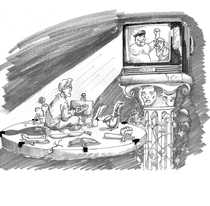Homo TV addict
 People dependence on TV is growing because they want to hide themselves from real life and its problems behind TV screen.
People dependence on TV is growing because they want to hide themselves from real life and its problems behind TV screen.
TV addiction is the most common form of addiction for residents of big cities. It is about endless watching any TV programs which damages your spare time, work, family and relatives. What are bad effects of TV on our lives?
When TV becomes a permanent background for one’s life, a person stops separating important and not important information. TV releases responsibility from the person and simultaneously fills one’s life with illusion of events. The new type of a person - "Homo TV addict” arises. This person loses the criteria for evaluating the occurring events and his/her identity. The person turns into the characters of the program he/she is watching on any given moment.
No doubt, city residents should have some means of relaxation from the fast tempo of their lives. The problem is that we unknowingly allow TV to dominate in our lives.
Scientists discovered that when watching TV a person can be in an unconscious state and may be unable to perceive new information. Meanwhile, human brain should be in constant activity based on continuous studying.
By spending 4 hours a day before the TV screen, the risk of obtaining short-sightedness increases by 70 percent. In addition, TV addiction can cause obesity.
The research conducted in Germany demonstrated that TV increases the probability of having neurosis.
The person addicted to TV spends little time outdoors, and this results in quick fatiguability, nervousness and feeling of being exhausted.
Abundance of violence on TV influences one’s emotions and contributes to becoming nervous.
Watching a 1.5 hour long movie is equal to receiving guests for 1.5 hours: a variety of conversations about ones’ lives, politics, sorting out ones’ relationships. At the same time, TV programs create not exhaustion, but over-excitement.
If a person spends 2-3 hours a day watching TV, this is addiction. For children this is half of this time.
Children are a special issue. For them watching TV is the way to escape loneliness. A child feels that the adults do not want to communicate with him/her and loves TV because it is more “communicative”.
Watching TV worsens digestion and the process of removing wasted products out of the organism, children addicted to TV more often become sick. Deviations in psychic and emotions result from informational influence on a child personality: memory becomes weaker, performance at school deteriorates, it is hard to concentrate for the child and he/she can suffer from insomnia. Problems in the relationships with parents arise if the adults request to stop watching TV.
TV creates the new behavior in a child by making him/her live by the laws of the “TV world”. By showing violence even in cartoons, TV teaches to despise the weak and introduces special way of life and communication.
Watching TV programs does not request concentration, and therefore teenagers become lazy and passive. Scientists believe that child absent-mindedness results from watching TV too much.
Japanese Association of Pediatricians called all parents and doctors to keep children under two years old away from TV screens. The latest research conducted by the Association revealed that watching TV reduces communication skills of children.
The Association published five recommendations about the TV dangerous effects on children and sent the recommendations to 7,000 state and private hospitals. This is the way to warn parents about the danger TV poses to children.
Young people are using TV as a ‘babysitter” more and more, and as a result, little kids spend much time watching TV. Video games and films increase this time.
The Association conducted research on 1,100 kids in prefecture Fukuoka. 96.6 percent of the kids lived in the families where TV was on 10 hours a day. These kids have a tendency to avoid eye contact when communicating to a person. In the families where TV was on three or less hours a day, only 37.5 of children had this feature.
Pediatricians concluded that this demonstrated that the more the child watches TV, the more disable he/she becomes in communicating other people. In addition, children addicted to TV are less proficient in speech.
Refrain from making a TV set a regular participant of your family rituals: dinners and suppers, talks before going to bed. Think about the role of TV in your life. If TV replaced you friends, travel and became your hobby, your child is likely to follow your path. In this case start your fighting with TV screen from yourself.
Subscribe to Pravda.Ru Telegram channel, Facebook, RSS!



